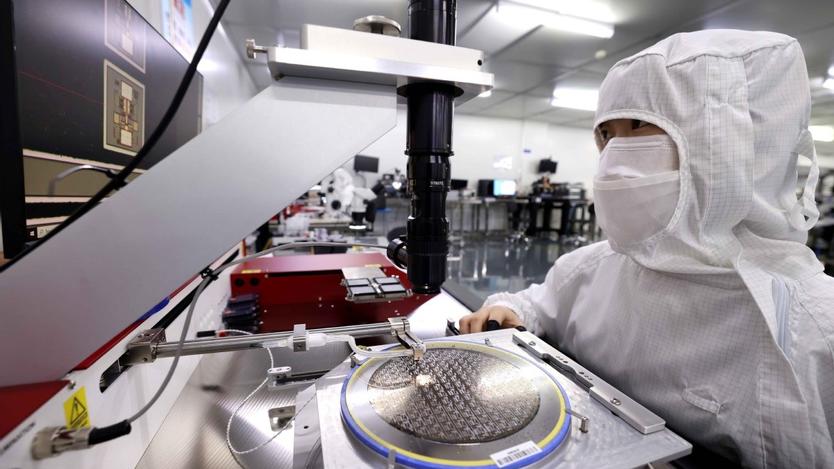Legislation hurts interests of companies globally, flouts WTO principles, trade groups say
 A technician tests chips at a tech firm in Hefei, Anhui province. (PHOTO BY XIE CHEN/FOR CHINA DAILY)
A technician tests chips at a tech firm in Hefei, Anhui province. (PHOTO BY XIE CHEN/FOR CHINA DAILY)
China has expressed strong opposition to the United States’ “unfair” new legislation on chip subsidies, saying that using political power to intervene in a sector that is highly globalized and based on market dynamics will eventually harm the interests of companies globally, including in the US.
The comments came after US President Joe Biden on Aug 9 signed the Chips and Science Act to offer $52.7 billion in subsidies and extra tax credits for US semiconductor production and research.
The legislation prohibits companies from expanding their advanced semiconductor manufacturing in China for 10 years after they receive a subsidy to build a US plant.
Foreign Ministry spokesman Wang Wenbin said at a news conference on Aug 10 that the legislation is an example of economic coercion by the US, and decoupling will harm both itself and others. Restrictions and suppression will not stop the pace of China’s technological and industrial development, he said.
In a joint statement on Aug 10, the China Council for the Promotion of International Trade and the China Chamber of International Commerce, two influential foreign trade associations, said the legislation is a typical industry-specific subsidy that does not conform to the nondiscrimination principles of the World Trade Organization.
The bill identifies particular countries as key targets, which would lead companies to be forced to adjust their global development strategies and layouts, they said. In particular, the bill gives a wide definition to “any country of concern”, which would infinitely expand the discretionary power of its law enforcement, they added.
Following passage of the bill, South Korean chip giant SK hynix dropped nearly 3.5 percent on Aug 10 on the Korea Exchange, while tech heavyweight Samsung Electronics Co Ltd fell 1.5 percent.
“The new semiconductor legislation is a high point in arbitrary US moves to set barriers to other countries like China, which can be seen from a series of previous moves like restricting China’s access to advanced chip manufacturing and design technologies,” said Feng Weijiang, secretary-general of the National Institute for Global Strategy at the Chinese Academy of Social Sciences.
He said the US is recovering its relatively unadvanced chip manufacturing industry at the expense of the efficiency and profits of multinational companies in the semiconductor field, adding that this move will also hamper innovation and development in the global semiconductor industry.
“Chip companies that are forced to choose sides will lose the Chinese market as the legislation requires them not to boost production of advanced chips in China if they are subsidized. But, in fact, no company would like to abandon China’s huge semiconductor market,” Feng said.
Hao Min, a professor of technology security at the University of International Relations in Beijing, said the US’ intention to boost its own growth by blocking other countries’ technological development will not work in the long run and will hurt the US in the end.
According to the latest US Congressional Budget Office estimates, the new semiconductor legislation will increase the US budget deficit by $48 billion over the next five years and by $79 billion through 2031.
While Boston Consulting Group expected it would cost $350 billion to $420 billion to create a self-sufficient semiconductor supply chain in the US, an executive from a Chinese chip designing and manufacturing firm, who wished to remain anonymous, said “the $52.7 billion subsidy is really a drop of water in the bucket, not to mention that it will be divided up by a number of chip companies”.
Contact the writers at chengyu@chinadaily.com.cn


